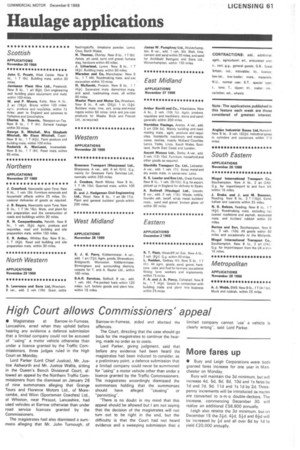High Court allows Commissioners' appeal
Page 63

If you've noticed an error in this article please click here to report it so we can fix it.
• Magistrates at Barrow-in-Furness, Lancashire, erred when they upheld before hearing any evidence a defence submission that a limited company could not be accused of "using" a motor vehicle otherwise than under a licence granted by the Traffic Commissioners, three judges ruled in the High Court on Monday.
Lord Parker (Lord Chief Justice), Mr. Justice Ashworth and Mr. Justice Wallis, sitting in the Queen's Bench Divisional Court, allowed an appeal by the Northern Traffic Commissioners from the dismissal on January 26 of nine summonses alleging that Grange Tours and Florence Motors Ltd., of Morecambe, and Winn (Sportsman Coaches) Ltd., of Whiston, near Prescot, Lancashire, had used vehicles at Barrow otherwise than under road service licences granted by the Commissioners.
The magistrates had also dismissed a summons alleging that Mr. John Turnough, of Barrow-in-Furness, aided and abetted the offences.
The Court, directing that the case should go back for the magistrates to continue the hearing, made no order as to costs.
Lord Parker, giving judgment, said that before any evidence had been heard the magistrates had been induced to consider, as a preliminary point, a defence submission that a limited company could never be summoned for "using" a motor vehicle other than under a licence granted by the Traffic Commissioners. The magistrates accordingly dismissed the summonses holding that the summonses should have alleged "causing" or "permitting".
"There is no doubt in my mind that this appeal should be allowed but I am not saying that the decision of the magistrates will not turn out to be right in the end, but the difficulty is that the Court had not heard evidence and a sweeping submission that a limited company cannot 'use' a vehicle is clearly wrong". said Lord Parker.








































































































































































